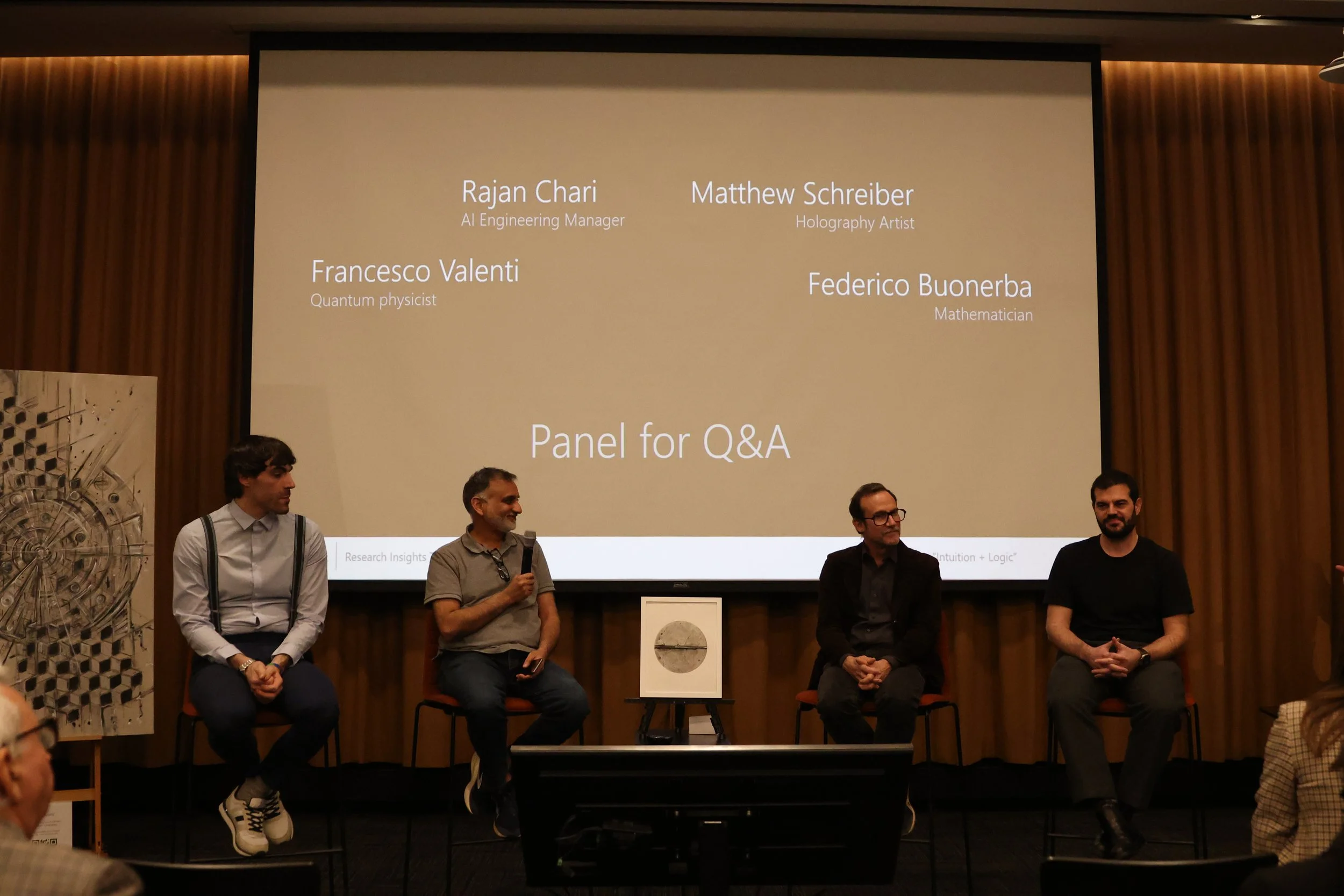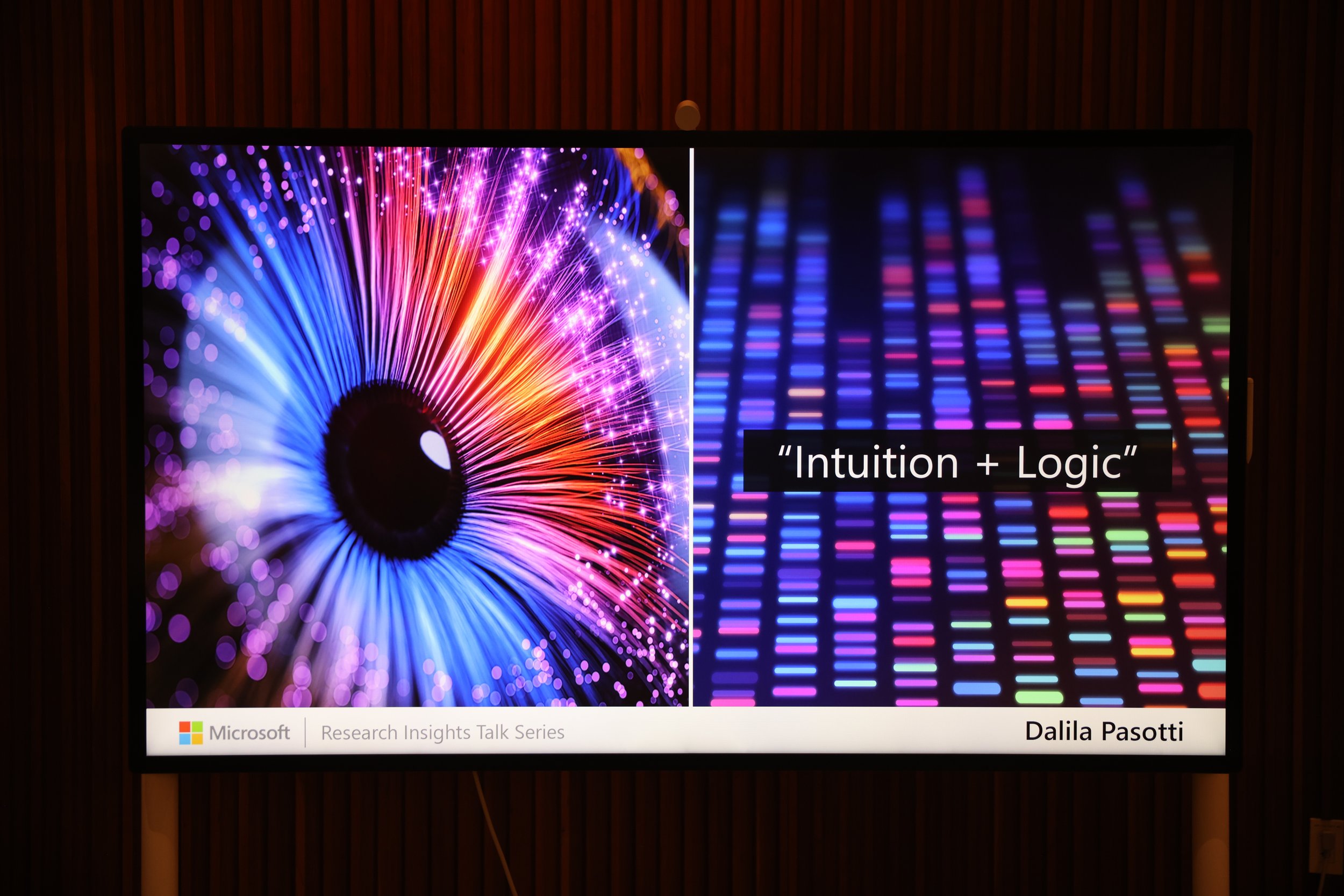Intuition + Logic: How Visuals Unlock Research’s Full Potential
Microsoft Research Lab
2/26/2025 6:00 - 8:30 pm
Scientific research can be challenging to convey in early stages, but a visual methodology holds the promise of connecting the dots.
This event showcased how scientific research can utilize aesthetics and the arts to give abstract concepts form in order to see, analyze, beautify, organize, and connect the dots for other researchers in relevant fields. Leading thinkers and practitioners in the fields of Artificial Intelligence, Quantum Computing, and Astrophysics discussed how this technique can be used across disparate fields to illustrate key concepts within their sometimes esoteric work.
Special Guest Speakers
Rajan Chari, AI researcher
Francesco Valenti, quantum physicist
John M Barbara, planetary astrophysicist
Matthew Schreiber, holography artist
Federico Buonerba, mathematician
Featuring the insights and work of Dalila Pasotti, Hosted by Mike Pell, Envisioneer and Director of the Microsoft Garage NYC






Intuition + Logic
How Visuals Unlock Research's Full Potential
by Dalila Pasotti
I thought it was just my artistic inclination that made visual and mental imaging so very powerful for me, but now I know there’s much more to it than that.
I delightfully discovered later in life that this approach of visualizing concepts is quite common among the people I like the most, look up to, and admire. Many of them are scientists. This is how they understand their own work.
As for me, I can’t personally make sense of things, even the most abstract things such as mathematics, without creating a mental pattern on my own. It’s hard for me to take things at face value if I don't run them through my internal “system”. That system is about training your mind to find patterns and seeing things in your own terms as opposed to letting the mind get lazy and just use what metal imagery has been pre-made by others. Even when that’s the case, we should make an extra effort to make things our own. When we do so, we will own them forever.
From a very early age, I can still remember my brilliant father saying “give me a piece of paper” whenever he had to explain something to me, and I guess without even noticing, that became my modus operandi. I often can’t understand things right away unless I construct them in my own mind.
I believe we can train ourselves to see and think with a deeper, more personal approach, to construct our intelligence day by day, just by unifying intuition with formal logic. Visualizing is clarifying, creating, and bringing into existence something that is just hidden in our ideas.
Beethoven was deaf when he envisioned the 9th symphony in his head.
Mathematics challenges us to constantly refer to things that don’t exist “for real”, yet you have to try to imagine them anyway. The mathematician David Bessis remarks in one of his books that the sole function of mathematical statements is to help you generate mental images, and only these images will lead to comprehension. Once you have the correct mental images, everything else becomes clear.
One of my passions when it comes to reading is to devour scientists’ biographies, as I can’t get enough of trying to understand who they really were and how they approached life, research and even their often strange habits and daily patterns.
What I’d like to talk about isn’t only formalism (which of course is necessary in any science), techniques or data, but also about intuition, and in that matter I’d love to talk about the entertaining and inspiring anecdotes I’ve learned about my heroes.
This is probably the reason why I’d like to dedicate this talk to them, but, in the light of the topic, especially to Alexander Grothendieck. (Grothendieck’s ideas influenced entire generations of mathematicians. His "Éléments de Géométrie Algébrique" (EGA) and "Séminaire de Géométrie Algébrique" (SGA) remain foundational texts. He was awarded the Fields medal the highest honor in mathematics, for his groundbreaking contributions).
Among the scientists, in this case, the mathematicians, he was probably the most vocal about the importance of constructing mental imagery, as he credited this way of thinking for all his stunning discoveries and advancements in math.
To quote him directly he stated:
“What drives and dominates my work, its soul and reason for being, are the mental images formed during the course of the work to apprehend the reality of mathematical things... All my life I’ve been unable to read a mathematical text, however trivial or simple it may be, unless I’m able to give this text a ‘meaning’ in terms of my experience of mathematical things, that is unless the text arouses in me mental images, intuitions that will give it life”.
- Alexandre Grothendieck
This resonated to me deeply. Looking back, I’m now sure that certain things at first I didn’t grasp, was simply the fact I wasn't properly constructing them in my head. To quote Grothendieck again he states:
“Interrogating things, listening to the voice of things, means trying to imagine them, examining the mental images that form within you, seeking to solidify these images and make them clearer, working at unveiling more and more details, as when you try to recall a dream.”
- Alexandre Grothendieck
He goes on describing mathematical work as a succession of physical activities. Grothendieck thought that it was worthless to gather information about things that you can’t yet see. Instead he allowed himself to imagine the things right away, without waiting, even when he was well aware that it might not work and his mental images would likely be "terribly wrong”.
He wasn’t scared of mistakes in fact he stated “Fear of mistakes and fear of the truth is one and the same thing. The person who fears being wrong is powerless to discover anything new. It’s when we fear making a mistake that the error which is inside of us becomes immovable as a rock”. I can’t agree more.
Mathematics is like any other physical activity, and needs constant training. Sometimes the only way to see if something is wrong is by writing it down.
When we talk about Feynman, probably beside QED, the other thing that comes to mind are the Feynman diagrams. What is startling is their simplicity, it is something that with a little effort we could all picture in our mind if someone explained the concept, yet most people don’t. Seeing that very basic structure, so clean and clear, will stick in your mind forever any time you’ll think about it, how the electrons move. And what I truly love is that that image is so simple that all it gives you is a solid building block where you can create your own mental structure, and not a too personal interpretation that will cut off your own imagination to do the work. Absolutely brilliant.
Among his many papers and books, Feynman wrote one he titled “ The pleasure of finding things out” which enhances the theory that you have to make your own mental construct in order to feel that thrill of understanding, the deeply satisfactory feeling of having grasped to the core the essence of something initially complicated.
“What I can’t create I don’t understand.”
-Richard Feynman
This kind of methodology isn’t new. Already Descartes affirmed “ I have fashioned a method by which, it seems to me, I have a way of adding progressively to my knowledge and raising it by degrees to the highest point that the limitation of my mind and the short span of life allotted to me will permit it to reach”. In fact Descartes' great innovation was to put intuition and subjectivity at the heart of his approach to knowledge. He was distrustful of established knowledge and what was written in books. He preferred to reconstruct everything by himself, in his head. This method closely resembles that of Einstein, Thurston, and Grothendieck.
“Things that we conceive of very clearly and distinctly are always true”
-Rene Descartes
Everything we still don’t comprehend or hasn’t yet been discovered comes across like black magic or fantasy, but it is just by pushing the imagination beyond the realm of the known that the true advancement and discovery occur.
This approach can lead to significant advancements to discovery but it has a double side, the one of being often misunderstood and even ridiculed and denied by others at first. In history it often turned out that these pioneers were right but they had to face a lot of resistance, even for several years. It happened to Cantor who was labeled “scientific charlatan” by the scientific community when he proposed his theory of infinity, to Einstein when he first thought of relativity, and Galileo almost ended up on the stake for supporting the Copernican Heliocentric theory. Boltzman took his own life due to the harsh critiques on his work, which was ultimately always correct. The list is very long.
The same Einstein strongly denied quantum mechanics when it came out as a theory labeling it as an abomination. (Einstein’s Relativity Theory was proven and finally accepted fully after the Eddington experiment in 1919).
Any scientific lecture has no value if the person giving it does not explain the reasoning and the intuition that led to that result. I believe it is necessary to reprogram intuition to truly understand science. Imagination is key.
Another of my favorite scientists is the mathematician Ramanujan. His poor upbringing in a village in India and lack of resources, forced his mind, unarguably very brilliant, to retrace and reconstruct on his own, almost from scratch, 200 years of mathematics, to become one of the most intuitive brilliant mathematicians in history. He claimed he had visions, he saw these theorems in his dreams and imagination, coming from some Hinduist goddess dear to him. In fact he was always so reluctant to work on proofs, which in the Cambridge of the times, and as a matter fact in the whole world of mathematics, are fundamental.
But, his theories were pretty much always right. It would have been so incredibly interesting and fascinating to have heard more about his visions and train of thoughts, but he died too soon to leave us more details on his method. Ultimately I believe that his genius has to be attributed to the way he trained his mental reasoning since a very young age, to the point that his subconscious was elaborating these strokes of genius almost on an autopilot.
In reality it is just the beauty of physics and the magnificent perfection of nature that we, as humble humans, struggle to come close.
Science is a realm for the visionaries, the passionate and the adventurous. Looking straight up to what is beyond comprehension is an act of courage and devotion.
Technology is your tool, vision and intuition is creation.
If you can’t see,all you can aim to be is just a very skilled number among many other numbers, you will lose your individuality.
Never forget that the real meaning of everything is to compete with yourself. Forget society constraints, the race to compete with others, or what you are supposed to accomplish. The real goal is the path you make for yourself.
Is probably when you realize that it is just you, your story, your imagination, you are your own universe, and it is your vision, exactly what you see in your head, what you create that gives meaning to your existence. The world you create inside your head, that is what the life experience really is.
The mind is the only boundless element in our lifetime. It could go as far as the edge of the universe, it can imagine. Everything. You must see, to create, innovate, to live at the fullest. You have the choice of living in Plato's cave forever, feeding on what is given to you, or you can take charge and create your own life experience. The choice is entirely yours.
This lecture can also be referred to the way we look at a tech company which has research divisions. I see a scientific company as a living organism. Envisioning this organism in its whole and keeping it optimally functioning requires a global vision that unifies the system as a mental mapping that becomes crystal clear with time. If the different branches of research don’t work in proper visual alignment the entire structure will suffer.
I’m encouraging you to keep a notebook and start seeing things, own things, on your own terms.
